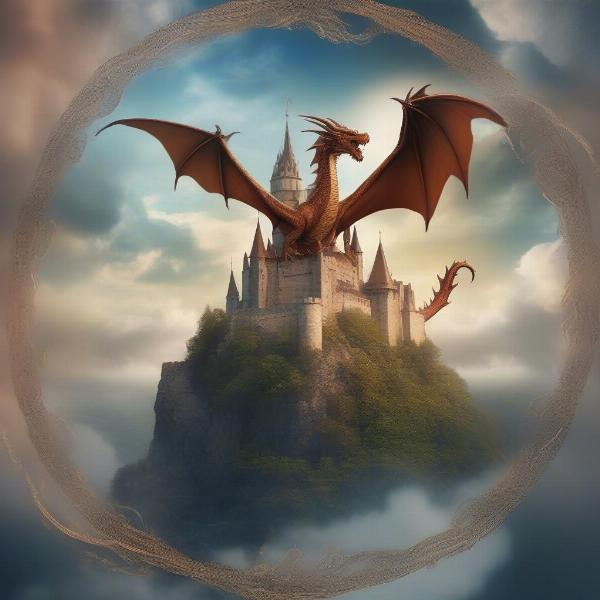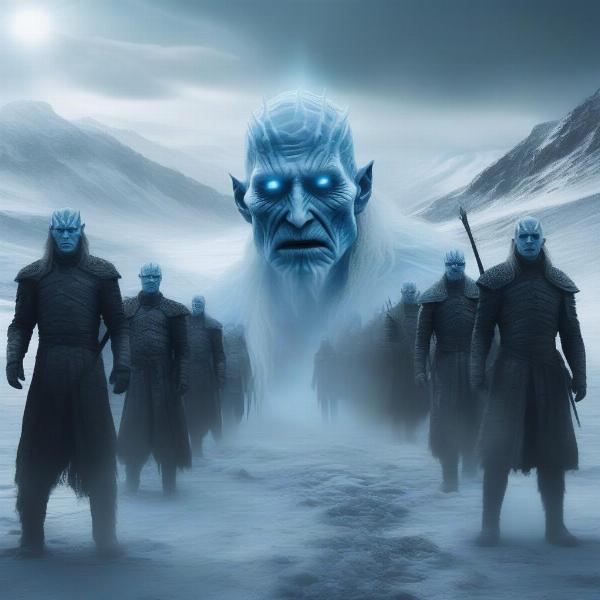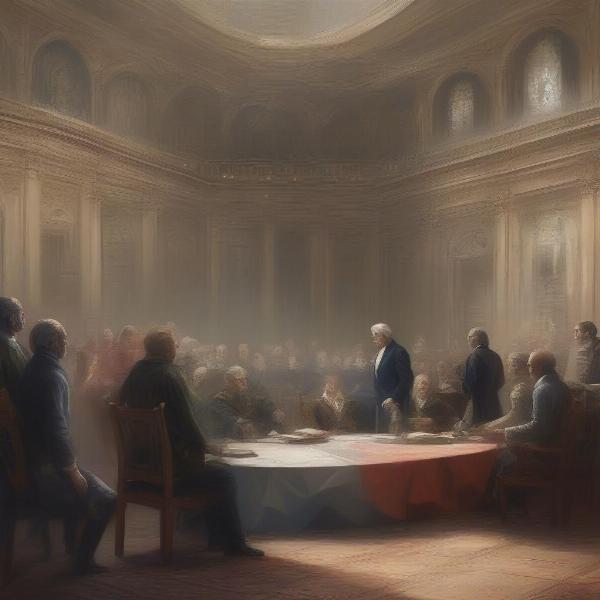Game of Thrones captivated audiences worldwide with its intricate plot, compelling characters, and epic scale. But beneath the surface of dragons and political intrigue, a question often arises: Is Game Of Thrones Science Fiction? Let’s explore the nuances of genre and analyze whether this beloved series truly fits the sci-fi mold.
While Game of Thrones leans heavily on fantasy tropes—magic, mythical creatures, and medieval settings—the absence of advanced technology or space travel often leads people to dismiss its sci-fi potential. However, the defining characteristic of science fiction isn’t necessarily the presence of specific elements, but rather the exploration of “what if” scenarios based on hypothetical changes to our reality. Could the presence of magic and dragons in the world of Westeros be considered such a hypothetical change, pushing the boundaries of our understanding of the natural world? This ambiguity opens the door to a fascinating discussion.
Magic: Science Yet Undiscovered?
One could argue that the magic system in Game of Thrones, while seemingly supernatural, operates under consistent rules and limitations. The varying strengths and weaknesses of different magical abilities, and the consequences associated with their use, hint at an underlying structure that could, theoretically, be understood and even manipulated. This resonates with Arthur C. Clarke’s famous third law: “Any sufficiently advanced technology is indistinguishable from magic.” Perhaps the magic in Game of Thrones represents a form of science not yet understood by its inhabitants, much like electricity or quantum physics might have appeared magical to people centuries ago. Are the dragons, with their fire-breathing abilities, simply a biological anomaly or a product of a deeper, undiscovered science?
 Game of Thrones Magic and Dragons
Game of Thrones Magic and Dragons
Parallel Universes and Alternate Histories: A Sci-Fi Staple
Furthermore, the very existence of Westeros, with its distinct geography, history, and societal structure, presents a “what if” scenario in itself. Could Westeros be considered a parallel universe, existing alongside our own but operating under different physical laws and historical trajectories? The exploration of alternate realities is a common theme in science fiction, allowing authors to examine the potential consequences of different choices and historical events. Game of Thrones, by creating a completely separate world with its own unique set of rules, arguably engages with this same core sci-fi concept. Could the cyclical nature of long winters and summers be a result of some unexplained celestial phenomenon, a scientific puzzle waiting to be solved?
Is Game of Thrones Science Fantasy? Blurring Genre Lines
Perhaps the most accurate categorization of Game of Thrones isn’t strictly science fiction or fantasy, but rather a blend of the two, often referred to as “science fantasy.” This subgenre encompasses works that combine elements of both, creating worlds where magic and science coexist, often intertwining in complex and unexpected ways. The presence of dragons and White Walkers might seem purely fantastical, but when considered alongside the political machinations, social dynamics, and even the potential for scientific explanations underlying the magic, a richer, more nuanced picture emerges. Just like asking if George R.R. Martin will ever finish the series, this question too, leaves fans speculating. You can learn more about that topic by reading our article, will george r r martin ever finish game of thrones.
 Game of Thrones White Walkers and Magic
Game of Thrones White Walkers and Magic
The Impact of Magical “Technology” on Society
Another aspect that aligns Game of Thrones with science fiction is the way its magic affects society. Similar to how technological advancements shape our world, the presence of magic in Westeros has profound implications for its political landscape, warfare, and social structures. The control and manipulation of dragons, for example, becomes a key factor in the struggle for power, mirroring the way technological superiority often dictates military dominance in our own world. This exploration of the societal impact of extraordinary abilities, whether magical or technological, is a recurring theme in science fiction.
What If Magic Was Real? A Thought Experiment
Ultimately, the question of whether Game of Thrones is science fiction boils down to how we define the genre itself. By framing the series as a thought experiment—”what if magic was real?”—we can appreciate its exploration of hypothetical scenarios and their consequences, a core tenet of science fiction. The series doesn’t offer definitive answers about the nature of its magic or the scientific underpinnings of its world, but it invites viewers to consider the possibilities, fostering a sense of wonder and intellectual curiosity.
 Game of Thrones Political Intrigue and Magic
Game of Thrones Political Intrigue and Magic
Exploring the Deeper Themes of Game of Thrones
This intricate narrative goes beyond dragons and magic, delving into complex political intrigue, betrayals, and power struggles. The intricate web of alliances and rivalries mirrors real-world historical conflicts, offering a commentary on human nature and the corrupting influence of power. These themes are often explored in science fiction as well, often using fictional settings to examine real-world issues in a new light.
Conclusion: A Genre-Bending Epic
While the definitive answer to whether Game of Thrones is science fiction remains open to interpretation, the series undeniably shares several key characteristics with the genre. Its exploration of hypothetical scenarios, the impact of extraordinary abilities on society, and the underlying structure of its magic system all contribute to a rich tapestry that blurs the lines between fantasy and science fiction. Whether you consider it pure fantasy, science fantasy, or even a unique subgenre of its own, Game of Thrones’ enduring popularity testifies to its ability to captivate and intrigue audiences with its complex world-building and compelling narrative. What do you think? Is Game of Thrones science fiction? Share your thoughts in the comments below!
FAQ
- Is Game of Thrones based on real events? While inspired by historical events like the Wars of the Roses, Game of Thrones is a work of fiction.
- What is the significance of the White Walkers? They represent a supernatural threat and force characters to confront existential dangers.
- How does magic influence the politics of Westeros? Control over magical abilities, like dragon-riding, grants significant political leverage.
- What is the meaning of “A Song of Ice and Fire”? This refers to the overarching conflict between opposing forces, symbolized by ice and fire.
- Why is Game of Thrones so popular? Its blend of complex characters, political intrigue, and fantastical elements resonates with a broad audience.
- Where can I watch or read Game of Thrones? The series is available on various streaming platforms and the books can be found in most bookstores.
- Is Game of Thrones suitable for all ages? Due to its mature themes and graphic content, it’s generally recommended for older viewers.

